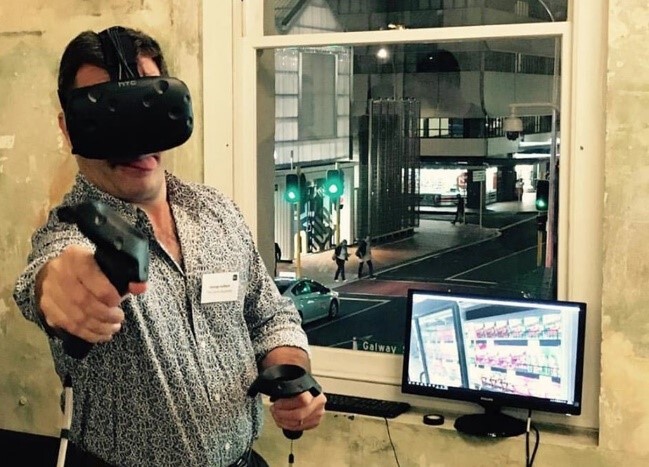Immersive storytelling – it's here and it's powerful. And there can be no doubt that virtual reality and augmented reality, when plugged into the massive turbo of artificial intelligence, are completely transforming the ways in which we receive information and communicate.
At the Clarity Mixer last week, we welcomed two companies, Rush Digital and IBM, who spoke to our audience with passion, knowledge and depth about the ways in which technology - in particular AI - is changing the world.
They also gave the audience a chance to use a virtual reality headset and handgrips, which – apart from being disorienting and thoroughly immersive – made me look like an utter pillock when I used them. Well, I did it myself really, didn't I? Let's face it, sticking out my tongue when attempting to grab a carton of virtual juice from a virtual fridge in a virtual supermarket will forever be a highlight of my Facebook career (thanks @Generator for posting that one…)
More seriously, and usefully, Rush Digital's founder Danushka Abeysuriya made a number of key points that are well worth noting:
AI should be viewed as creating opportunities, not costing jobs
Beginning development in the 1980s, augmented intelligence first surfaced in interfaces such as IMB's Deep Blue. The reason this curated interest was because it really emphasized the speaker's notion that we are on the cusp of a new industrial revolution. With such advanced technology which was once on the backburners, now being brought into the front of development. Strides in areas thought untouchable are being made constantly. From Deep Blue till now, AI has been on a huge journey – and one that will take it on to achieve a 'human intelligence' level. Once that is unlocked, the world will change again.
And then, the longer a technology is embedded and established, the harder it is to remove. It's hard to imagine life without Facebook these days, or Uber/Air BnB etc. The 'penny drop moment' happened years ago with Facebook, and now everyone is on it – even your grandma, as it ages up as a platform. It also happened with Uber, and people's quality of life improved because it solved a genuine problem.
We need to challenge our own assumptions
Showing us a video of Ashton Kutcher talking about how he came to invest in Uber and Air BnB, Danu made the point that the foundation of great companies is often counter-intuitive, but the gaps they create when they identify the right problems are the key to the green pastures of a successful future; it's a fundamental intuition.
At the Clarity Mixer last week, we welcomed two companies, Rush Digital and IBM, who spoke to our audience with passion, knowledge and depth about the ways in which technology - in particular AI - is changing the world.
They also gave the audience a chance to use a virtual reality headset and handgrips, which – apart from being disorienting and thoroughly immersive – made me look like an utter pillock when I used them. Well, I did it myself really, didn't I? Let's face it, sticking out my tongue when attempting to grab a carton of virtual juice from a virtual fridge in a virtual supermarket will forever be a highlight of my Facebook career (thanks @Generator for posting that one…)
More seriously, and usefully, Rush Digital's founder Danushka Abeysuriya made a number of key points that are well worth noting:
AI should be viewed as creating opportunities, not costing jobs
Beginning development in the 1980s, augmented intelligence first surfaced in interfaces such as IMB's Deep Blue. The reason this curated interest was because it really emphasized the speaker's notion that we are on the cusp of a new industrial revolution. With such advanced technology which was once on the backburners, now being brought into the front of development. Strides in areas thought untouchable are being made constantly. From Deep Blue till now, AI has been on a huge journey – and one that will take it on to achieve a 'human intelligence' level. Once that is unlocked, the world will change again.
And then, the longer a technology is embedded and established, the harder it is to remove. It's hard to imagine life without Facebook these days, or Uber/Air BnB etc. The 'penny drop moment' happened years ago with Facebook, and now everyone is on it – even your grandma, as it ages up as a platform. It also happened with Uber, and people's quality of life improved because it solved a genuine problem.
We need to challenge our own assumptions
Showing us a video of Ashton Kutcher talking about how he came to invest in Uber and Air BnB, Danu made the point that the foundation of great companies is often counter-intuitive, but the gaps they create when they identify the right problems are the key to the green pastures of a successful future; it's a fundamental intuition.
Companies such as Uber were founded off ideas not originally accepted as the status quo, but were able to shift societal perspectives so that their business was not only profitable, but also necessary. Danu also cited Amazon as another good example, saying how a company that once sold books out of a garage is now a massive tech company that runs on top of the internet – so what can you run on top of AR/VR?
Swallow your pride, evolve or die
Danu closed with a plea for businesses to constantly adapt in their environment in order to keep one step ahead – or as he put it: "swallow your pride, evolve or die!"
Isuru Fernando, analytics and Artificial Intelligence Lead at IBM gripped the audience with a demonstration of the IBM augmented intelligence concept: Watson
Showing the AI link-up with chef Simon Gault in Cognitive Cooking with Chef Watson Simon Gault used Cognitive Computer functions to create a vibrant and unique menu for a restaurant. This definitely sparked something within the crowd, because it was a strong display of the strides in technology that can benefit people at work, showing how the limits of the human 'data-base' could be solved through machinery.
Combinations which were just out of reach in your mind are easily and efficiently sourced through augmented intelligence. So together, with the initial thought process beginning with the person and being aided by intelligence there are multiple opportunities which could not be recognised initially.
And then we played with the VR headset, and the rest is history…
Please contact us if you'd like to come along to the next Clarity Mixer, which will be on Tuesday 20th June at Generator.
Swallow your pride, evolve or die
Danu closed with a plea for businesses to constantly adapt in their environment in order to keep one step ahead – or as he put it: "swallow your pride, evolve or die!"
Isuru Fernando, analytics and Artificial Intelligence Lead at IBM gripped the audience with a demonstration of the IBM augmented intelligence concept: Watson
Showing the AI link-up with chef Simon Gault in Cognitive Cooking with Chef Watson Simon Gault used Cognitive Computer functions to create a vibrant and unique menu for a restaurant. This definitely sparked something within the crowd, because it was a strong display of the strides in technology that can benefit people at work, showing how the limits of the human 'data-base' could be solved through machinery.
Combinations which were just out of reach in your mind are easily and efficiently sourced through augmented intelligence. So together, with the initial thought process beginning with the person and being aided by intelligence there are multiple opportunities which could not be recognised initially.
And then we played with the VR headset, and the rest is history…
Please contact us if you'd like to come along to the next Clarity Mixer, which will be on Tuesday 20th June at Generator.

